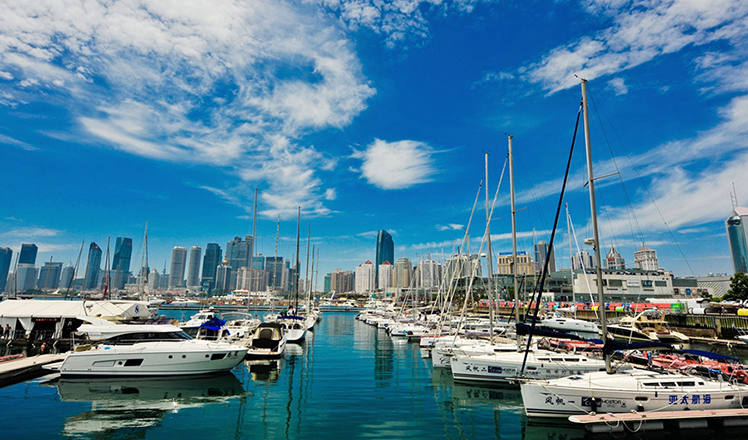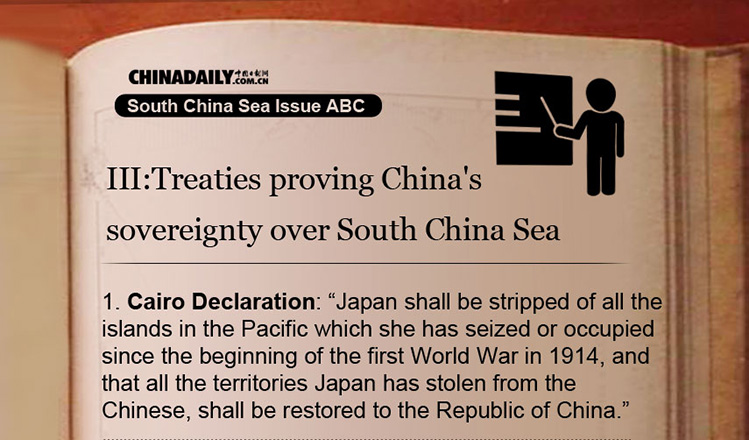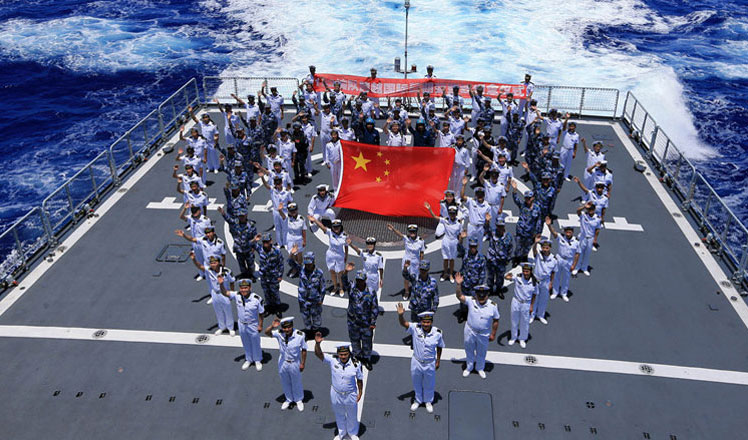US pulled the strings behind the Philippines, observers say
Updated: 2016-07-13 07:44
By Mo Jingxi(China Daily)
|
||||||||
The United States was behind the Philippines, trying to stir up matters in the South China Sea in order to block China and thus improve its regional military and diplomatic presence, experts said.
They made the remark as the tribunal in The Hague issued its ruling on Tuesday in the arbitration case unilaterally initiated by the former Philippine government.
The administration of former Philippine president Benigno Aquino was used as a pawn by the US to aid its Asia-Pacific rebalancing strategy, they said.
Tao Wenzhao, a researcher of US studies at the Chinese Academy of Social Sciences, said the arbitration was not solely the business of the Philippines.
"We can see that Washington, which never ratified the United Nations Convention on the Law of the Sea, encouraged and supported Manila to initiate the arbitration case from the very beginning," Tao said, adding that top lawyers Manila hired were US citizens.
Myron Nordquist, associate director of the Center for Oceans Law and Policy at the University of Virginia School of Law, said: "Now the Filipinos are having such fun making faces at China, hiding behind the US military, thinking they are really doing something wonderful.
"If the US ever became a party to this agreement, we would have opted out, as the Chinese did."
In fact, the US established the precedent of "nonparticipation and nonacceptance" of a ruling by a third party to settle an international dispute in the Nicaragua case of the 1980s.
Recently, seven US warships have been patrolling the South China Sea, including the aircraft carrier Ronald Reagan as well as three destroyers sailing close to Chinese reefs and islands.
Oskar Krejci, director of the Institute of Global Studies at the University of Jan Amos Komensky Prague, said what the US is doing in the region is not acting as someone trying to restore balance would act.
Instead, it acts as a purveyor of "a military presence strategy, and therefore is making an effort to maintain US hegemony in the region", Krejci said.
If the situation in the South China Sea intensifies, the US will have more excuses to increase its military deployment in the Asia-Pacific, an important part of its rebalancing policy, Tao said.
Wang Shaopu, director of the Japan Study Center at Shanghai Jiaotong University, told Xinhua News Agency that Japan has adapted itself to Washington's Asia-Pacific rebalancing strategy to counter China, and its interference in the South China Sea is an example.
Jia Xiudong, a senior research fellow at the China Institute of International Studies, said the impartiality of the ruling itself is questionable since four of the five arbitrators responsible for the case were picked by a Japanese rightist Shunji Yanai, former president of the International Tribunal for the Law of the Sea.
- The South China Sea Arbitration: Illegal, Illegitimate and Invalid
- Theresa May set to be UK's next Prime Minister after rival stands down
- Killing of UN Chinese peacekeepers slamed
- UK's Cameron hums merry tune after announcing PM handover moves
- Manhattanhenge seen in New York
- Philippine, Japan coast guards to hold exercise off Manila Bay

 Tim Duncan announces retirement after 19 seasons with Spurs
Tim Duncan announces retirement after 19 seasons with Spurs
 Merchandize for Rio 2016 a hit in run-up to games
Merchandize for Rio 2016 a hit in run-up to games
 Top 10 best Chinese cities to own a house
Top 10 best Chinese cities to own a house
 Getting to know South China Sea Issue
Getting to know South China Sea Issue
 Ronaldo-less Portugal wins Euro 2016 title
Ronaldo-less Portugal wins Euro 2016 title
 Chinese navy fleet joins RIMPAC 2016 open day
Chinese navy fleet joins RIMPAC 2016 open day
 Staying cool at the zoo amid Shanghai heat wave
Staying cool at the zoo amid Shanghai heat wave
 Tibet through the lens of China Daily reporter
Tibet through the lens of China Daily reporter
Most Viewed
Editor's Picks

|

|

|

|

|

|
Today's Top News
Ministry slams US-Korean THAAD deployment
Two police officers shot at protest in Dallas
Abe's blame game reveals his policies failing to get results
Ending wildlife trafficking must be policy priority in Asia
Effects of supply-side reform take time to be seen
Chinese State Councilor Yang Jiechi to meet Kerry
Chinese stocks surge on back of MSCI rumors
Liang avoids jail in shooting death
US Weekly

|

|







